高中英语必修二unit4课文及听力原文
高中英语必修二unit4课文听力原文

1.HOW DAISY LEARNED TO HELP WLDLIFE(26页)Daisy had always longed to help endangered species of wildlife. One day she woke up and found a flying carpet by her bed. "Where do you want to go?" it asked. Daisy responded immediately. "I'd like to see some endangered wildlife," she said. "Please take me to a distant land where I can find the animal that gave fur to make this sweater." At once the carpet flew away and took her to Tibet. There Daisy saw an antelope looking sad. It said, "We're being killed for the wool beneath our stomachs. Our fur is being used to make sweaters for people like you. As a result, we are now an endangered species." At that Daisy cried, "I'm sorry I didn't know that. I wonder what is being done to help you. Flying carpet, please show me a place where there's some wildlife protection."The flying carpet travelled so fast that next minute they were in Zimbabwe. Daisy turned around and found that she was being watched by an elephant. "Have you come to take my photo?" it asked. In relief Daisy burst into laughter. "Don't laugh,”said the elephant, "We used to be an endangered species. Farmers hunted us without mercy. They said we destroyed their farms, and money from tourists only went to the large tour companies. So the government decided to help. They allowed tourists to hunt only a certain number of animals if they paid the farmers. Now the farmers are happy and our numbers are increasing. So good things are being done here to save local wildlife."Daisy smiled. "That's good news. It shows the importance of wildlife protection, but I'd like to help as the WWF suggests." The carpet rose again and almost at once they were in a thick rainforest. A monkey watched them as it rubbed itself. "What are you doing?" asked Daisy. ”I’m protecting myself from mosquitoes," it replied. "When I find a millipede insect, I rub it over my body. It contains a powerful drug which affects mosquitoes. You should pay more attention to the rainforest where I live and appreciate how the animals live together. No rainforest, no animals, no drugs."Daisy was amazed. "Flying carpet, please take me home so I can tell WWF and we can begin producing this new drug. Monkey, please come and help." The monkey agreed. The carpet flew home. As they landed, things began to disappear. Two minutes later everything had gone - the monkey, too. So Daisy was not able to make her new drug. But what an experience! She had learned so much! And there was always WWF…第四单元阅读一Daisy如何学习去帮助野生动物Daisy常常渴望去帮助濒临灭绝的种类的野生动物。
Unit+4+Reading+for+Writing+课文精读高中英语人教版(2019)必修第二册

机会 体验 顺道拜访 当地的 传统的 能够 介绍 可能做某事
多于 习俗 亲身,一手的
感谢您的聆听与观看
为了有机会体验到这一点,可以在乡村酒吧停下来,然后喝上一杯葡萄酒或当地的啤酒放松一下。更好的是, 享受美味的传统爱尔兰炖牛肉。如果幸运的话,你也许还可以欣赏到传统的音乐和舞蹈。如果你把自己介绍 给一个友好的面孔,那么你更有可能亲身体验当地的文化和习俗。
chance experiencing stop by local traditional be able to introduce be likely to more than customs first-hand
必修二Unit4 Reading for Writing
课文精读
BEAUTIFUL IRELAND AND ITS TRADITIONS美丽的爱尔兰及其传统
Ireland’s beautiful countryside has always had a great influence on its people and
On a quiet morning in the mountains, feel the sun on your skin, and breathe in
Байду номын сангаасthe sweet scent of fresh flowers while birds greet the new day with their
traditions. The country has a long history of producing great writers and poets. Its
beautiful countryside excites and inspires all, offering something for each of the
高中英语必修二unit4课文及听力原文
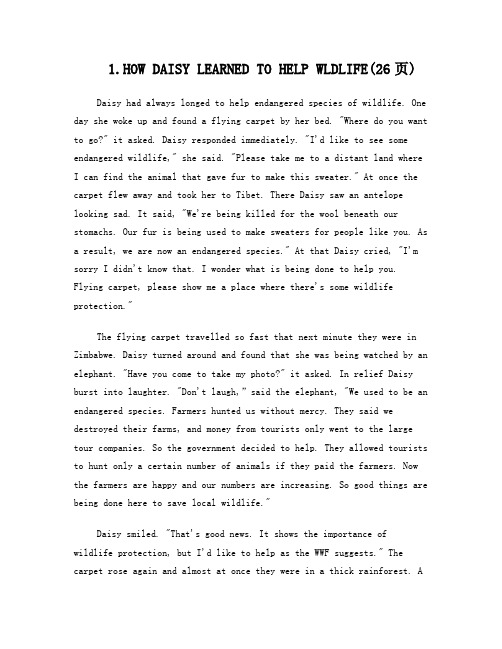
1.HOW DAISY LEARNED TO HELP WLDLIFE(26页)Daisy had always longed to help endangered species of wildlife. One day she woke up and found a flying carpet by her bed. "Where do you want to go?" it asked. Daisy responded immediately. "I'd like to see some endangered wildlife," she said. "Please take me to a distant land where I can find the animal that gave fur to make this sweater." At once the carpet flew away and took her to Tibet. There Daisy saw an antelope looking sad. It said, "We're being killed for the wool beneath our stomachs. Our fur is being used to make sweaters for people like you. As a result, we are now an endangered species." At that Daisy cried, "I'm sorry I didn't know that. I wonder what is being done to help you. Flying carpet, please show me a place where there's some wildlife protection."The flying carpet travelled so fast that next minute they were in Zimbabwe. Daisy turned around and found that she was being watched by an elephant. "Have you come to take my photo?" it asked. In relief Daisy burst into laughter. "Don't laugh,”said the elephant, "We used to be an endangered species. Farmers hunted us without mercy. They said we destroyed their farms, and money from tourists only went to the large tour companies. So the government decided to help. They allowed tourists to hunt only a certain number of animals if they paid the farmers. Now the farmers are happy and our numbers are increasing. So good things are being done here to save local wildlife."Daisy smiled. "That's good news. It shows the importance ofwildlife protection, but I'd like to help as the WWF suggests." The carpet rose again and almost at once they were in a thick rainforest. Amonkey watched them as it rubbed itself. "What are you doing?" asked Daisy. ”I’m protecting myself from mosquitoes," it replied. "When I find a millipede insect, I rub it over my body. It contains a powerful drug which affects mosquitoes. You should pay more attention to the rainforest where I live and appreciate how the animals live together. No rainforest, no animals, no drugs."Daisy was amazed. "Flying carpet, please take me home so I can tell WWF and we can begin producing this new drug. Monkey, please come and help." The monkey agreed. The carpet flew home. As they landed, things began to disappear. Two minutes later everything had gone - the monkey, too. So Daisy was not able to make her new drug. But what an experience! She had learned so much! And there was always WWF…第四单元阅读一Daisy如何学习去帮助野生动物Daisy常常渴望去帮助濒临灭绝的种类的野生动物。
英语听力教程(第2册)Unit4听力原文
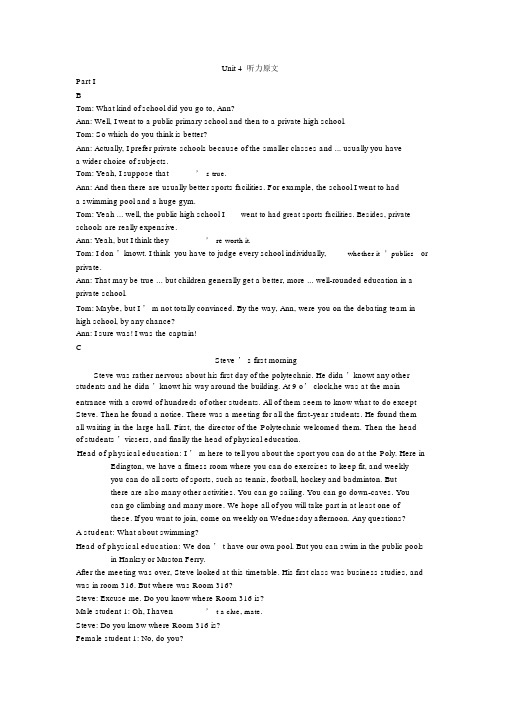
Unit 4 听力原文Part IBTom: What kind of school did you go to, Ann?Ann: Well, I went to a public primary school and then to a private high school.Tom: So which do you think is better?Ann: Actually, I prefer private schools because of the smaller classes and ... usually you havea wider choice of subjects.Tom: Yeah, I suppose that’ s true.Ann: And then there are usually better sports facilities. For example, the school I went to hada swimming pool and a huge gym.Tom: Yeah ... well, the public high school I went to had great sports facilities. Besides, private schools are really expensive.Ann: Yeah, but I think they’ re worth it.or Tom: I don ’knowt. I think you have to judge every school individually,whether it ’publics private.Ann: That may be true ... but children generally get a better, more ... well-rounded education in a private school.Tom: Maybe, but I ’ m not totally convinced. By the way, Ann, were you on the debating team in high school, by any chance?Ann: I sure was! I was the captain!CSteve ’ s first morningSteve was rather nervous about his first day of the polytechnic. He didn ’knowt any other students and he didn ’knowt his way around the building. At 9 o’ clock,he was at the main entrance with a crowd of hundreds of other students. All of them seem to know what to do except Steve. Then he found a notice. There was a meeting for all the first-year students. He found them all waiting in the large hall. First, the director of the Polytechnic welcomed them. Then the headof students ’vics e rs, and finally the head of physical education.Head of physical education: I’m here to tell you about the sport you can do at the Poly. Here in Edington, we have a fitness room where you can do exercises to keep fit, and weeklyyou can do all sorts of sports, such as tennis, football, hockey and badminton. Butthere are also many other activities. You can go sailing. You can go down-caves. Youcan go climbing and many more. We hope all of you will take part in at least one ofthese. If you want to join, come on weekly on Wednesday afternoon. Any questions?A student: What about swimming?Head of physical education: We don’t have our own pool. But you can swim in the public pools in Hanksy or Muston Ferry.After the meeting was over, Steve looked at this timetable. His first class was business studies, and was in room 316. But where was Room 316?Steve: Excuse me. Do you know where Room 316 is?Male student 1: Oh, I haven’ t a clue, mate.Steve: Do you know where Room 316 is?Female student 1: No, do you?Steve: I’ m looking for Room 316.Male student 2: Oh, not another First year. Look at the notice board.Steve: But where is the notice board?Male student 2: Don’ t ask me.Steve: Could you tell me where Room 316 is?Female student 2: You mean business studies for Catering students.Steve: That’ s it.Female student 2: Oh, I’ m looking for it for myself. You-year?’ re a firstSteve: Yes.Female student 2: So am I. Let’ s see if we can find it together.Questions:1. Where was Steve at 9 o’ clock?2.How many people made welcome speeches at the meeting for all the first year students?3.Who are they?4.What kinds of sports are available in Edington Polytechnic?5. What was Steve’ s first class?6.Where will he have the class?7.How many students did Steve ask when he tried to find his class?8.Did he get the answer?Part II Home schoolingAlthough education is compulsory in the United States, it is not compulsory for all children toget their education at school. A number of parents believe that they can provide a better educationfor their children at home. Children who are educated at home are known as-schoolers.“” home There are about 300 000 home-schoolers in the United States today. Interestingly, results showthat home-schooled children tend to do better than average on national tests in reading and math.David Guterson is an American writer. He and his wife teach their three children themselves.Guterson says that his children learn very differently from children in a regular school. Learningstarts with the children’ s interests and questions. For example, when there is heavy snowfall on a winter day, it may start a discussion or reading about climate, snow removal equipment, Alaska,polar bears, and winter tourism. Or a spring evening, when the family is watching the stars, is a goodtime for setting up a telescope and asking questions about satellites, comets, meteors, and thespace program. At dinner, if the Brazilian rain forests are on the news, it could be a perfect time toget out the atlas and encyclopedia. Then there might be two hours or more of eating, askingquestions, looking up answers, discovering how rain forests influence the climate, what the“ greenhouse effect” is, how deserts are formed and how the polarpsiceaffectca ocean levels.Although home schooling offers an experience that is often more interesting than regularschools, critics point out that home-schoolers miss out on many important things. The home-schooler is an outsider who, because he or she never attended school, might be uncomfortablemixing with other people in adult life. Critics also say that most parents are not well qualified to teachtheir children and may pass on their own narrow views to their children.However, most parents don ’ t havetimethor desire to teach their children at home, so schools willcontinue to be where most children get their formal education.Part IIIAJohn James: I disagree, Peter. I don’ t think it really matters what your educational background is. Anyone who is bright enough is going to do well whatever their education.Peter Davies: But John, ...John James: In fact, I think some people carry on with their education when they would do a lotbetter to get out and start building their own careers by learning things in real life.Peter Davies: Yes, but the whole point is, life is getting so much more complicated these days thatunless you carry on with your studies you just can’ t cope.John James: For certain things, and certain people, OK, but to my mind, the big problem ineducation is that you specialize too quickly. I mean, in England, you start specializing from thethird year in secondary school, when you’ re about 14. And it gets steadily narrower until you doyour “ A”levels in only two or three subjects. You either do languages, or natural sciences, orsocial sciences.Peter Davies: But surely these days you have to, John — you can ’possiblyt study everythingbecause there ’ s just too much.John James:Yes, but how many kids at the age of sixteen really know what they want to do? Howmany of them are convinced that the three subjects they’ve chosen, or have been recommended,are the ones that will let them follow the careers they eventually decide on?Peter Davies: Oh, I think most young people who stay on at school have a fair idea of what theywant to do.John James:I’m not so sure, Peter. And after all, that’s not the end of it. When they get touniversity in England, the subjects they study are so narrow that they are only good for one thing,so they are stuck with it.Peter Davies: But I don’ t really see that there is any alternative if people are going to learn enoughto be competent in their subject. They’ ve got to specialize early, and I suppose those that realizethey ’ ve made a mistake can always swap tomethings else.John James: Ah, but that ’s just it. You can ’t. Suppose you study languages at university and thendecide that you are not cut out for it and would like to be a doctor. You’ve burnt your bridges. Youcan’tjust change horses in midstream; you ’ve got to go right back to the beginning and you loseyears. I think the American system is much better.BJohn James: ... I think the American system is much better.Peter Davies: In what way?John James: Well, for your first degree you ’ vefairlygotwidetostudyrange of subjects, and youcan choose them yourself, within certain limits.Peter Davies: Fine, but doesn’ t that mean that American students with a first degree dondepth of knowledge they should have?John James: Should have for what?Peter Davies: Well, they often aren’ t accepted for postgraduate work in England with just a first degree.John James: Maybe not, but I don’ t really think that’ s important. They come out with a pretty good general knowledge in a wide area. After all, when you think about a lot of the stuff Englishstudents have to study, what good is it to them afterwards?I ’ msure the majority of Britishstudents never use 90 percent of what they studied at university.Peter Davies: That may be true of some arts subjects, but what about the sciences?John James: Even there, a lot what they do at university is so academic and abstruse that they willnever be able to put it to any practical use. I’ m sure they would benefit-thefar-morejob from on experience. And if they ’ ve had a broader course of study they’ ve got two advantages.Peter Davies: How do you mean?John James: First of all, they will have a better understanding of the world in general, so they willbe more flexible in their jobs, and then if things do go wrong they will be able to switch jobseasily.Peter Davies: That all sounds very simple, but I think you’ re still underestimating the amount of pure learning that you need these days, particularly in technical and scientific areas. I mean evenat school these days, children have to learn far more things than we did when we were at school. JohnJames: All the more reason we should not try to concentrate on such a few things at such an early age.Things are changing so rapidly these days that we have to change with them. When we were younger,there was a pretty good chance that we would be able to carry on in the profession we’ d chosenuntil we retired. But these days, people have got to be prepared to change their jobsand learn new skills as technology moves ahead. Take j ust the area of the office, for example.How many offices ...Part ⅣImagine being asked to spend twelve or so years of your life in a society which consistedonly of members of your own sex. How would you react? Unless there was something definitelywrong with you, you wouldn’ t be so happy about it, to say the least. It is all the more surprisingtherefore that so many parents in the world choose to impose such abnormal conditions on theirchildren — conditions which they themselves wouldn put up with’t for one minute!Any discussion of this topic is bound to question the aims of education. Stuffing childrenhead full of knowledge is far from being foremost among them. One of the chief aims of educationis to equip future citizens with all they require to take their place in adult society. Now adultsociety is made up of men and women, so how can a segregated school possibly offer the rightsort of preparation for it? Anyone entering adult society after years of segregation can only be infor a shock.A co-educational school offers children nothing less than a true version of society inminiature. Boys and girls are given the opportunity to get to know each other, to learn to livetogether from their earliest years. They are put in a position where they can compare themselveswith each other in terms of academic ability, athletic achievement and many of the extra-curricularactivities which are part of school life. What a practical advantage it is (to give just a smallexample) to be able to put on a school play in which the male parts will be taken by boys and thefemale parts by girls! When segregated, boys and girls are made to feel that they are a race apart.In a co-educational school, everything falls into its proper place.But perhaps the greatest contribution of co-education is the healthy attitude to life itencourages. Boys don’ t grow up believing that women are mysterious creatures. Girls don’up imagining that men are romantic heroes. Years of living together dispel illusions of this kind.The awkward stage of adolescence brings into sharp focus some of the physical and emotionalproblems involved in growing up. These can better be overcome in a co-educational environment.When the time comes for the pupils to leave school, they are fully prepared to enter society aswell-adjusted adults. They have already had years of experience in coping with many of theproblems that face men and women.Part VIs China the world’ s cleverest country?China achieved “ remarkable results” in the Pisa international education tests, which measurepupils’ key skills: reading, numeracy and science.The results indicate that China’ s education system is not only above average, it’ s o the performance of many Western countries. But why do Chinese students get top marks?Andreas Schleicher, who is responsible for the Pisa tests, says Chinese students showincredible resilience to become high- flyers, regardless of their background.“ North Americans tellyou typically it’ s all luck. In Europe, it’ s all about social heritage:‘ My father was a pl I ’ m going to be a plumber.’ In China, more than nine out of 10 children tell you:‘ It de effort I invest and I can succeed if I study hard.’”Mr Schleicher adds it ’a sphilosophical difference –we should expect the whole cohort topass with flying colours, rather than just expecting the cream of the crop to succeed.On a visit to a poor province in China, he noticed that schools were often the most impressivebuildings. He says in the West, it’ s more likely to be a shopping centre.So should other countries put their thinking caps on if they don’ t want their education syst to flunk? When it comes to education, China might be able to teach the world a lesson.key skills 关键技能above average 高于平均水平performance 成绩top marks 高分high-flyers 成功人士social heritage 社会遗产invest 投入cohort 有共同点的一群人pass with flying colours高分通过the cream of the crop 顶尖人才put their thinking caps on 进入思考状态flunk失败(常指考试不及格)teach (someone) a lesson给(某人)一个教训Quiz 小测验8、这个世界并不是掌握在那些嘲笑者的手中,而恰恰掌握在能够经受得住嘲笑与批忍不断往前走的人手中。
人教版高一必修二英语unit 4听力材料
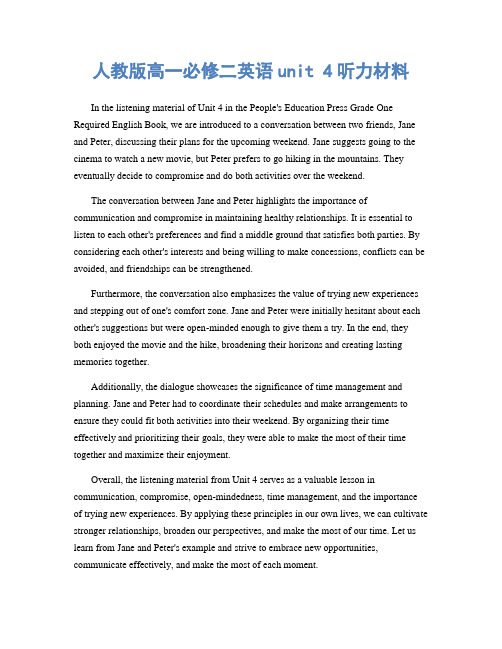
人教版高一必修二英语unit 4听力材料In the listening material of Unit 4 in the People's Education Press Grade One Required English Book, we are introduced to a conversation between two friends, Jane and Peter, discussing their plans for the upcoming weekend. Jane suggests going to the cinema to watch a new movie, but Peter prefers to go hiking in the mountains. They eventually decide to compromise and do both activities over the weekend.The conversation between Jane and Peter highlights the importance of communication and compromise in maintaining healthy relationships. It is essential to listen to each other's preferences and find a middle ground that satisfies both parties. By considering each other's interests and being willing to make concessions, conflicts can be avoided, and friendships can be strengthened.Furthermore, the conversation also emphasizes the value of trying new experiences and stepping out of one's comfort zone. Jane and Peter were initially hesitant about each other's suggestions but were open-minded enough to give them a try. In the end, they both enjoyed the movie and the hike, broadening their horizons and creating lasting memories together.Additionally, the dialogue showcases the significance of time management and planning. Jane and Peter had to coordinate their schedules and make arrangements to ensure they could fit both activities into their weekend. By organizing their time effectively and prioritizing their goals, they were able to make the most of their time together and maximize their enjoyment.Overall, the listening material from Unit 4 serves as a valuable lesson in communication, compromise, open-mindedness, time management, and the importance of trying new experiences. By applying these principles in our own lives, we can cultivate stronger relationships, broaden our perspectives, and make the most of our time. Let us learn from Jane and Peter's example and strive to embrace new opportunities, communicate effectively, and make the most of each moment.。
人教高中英语必修二第四单元听力原文
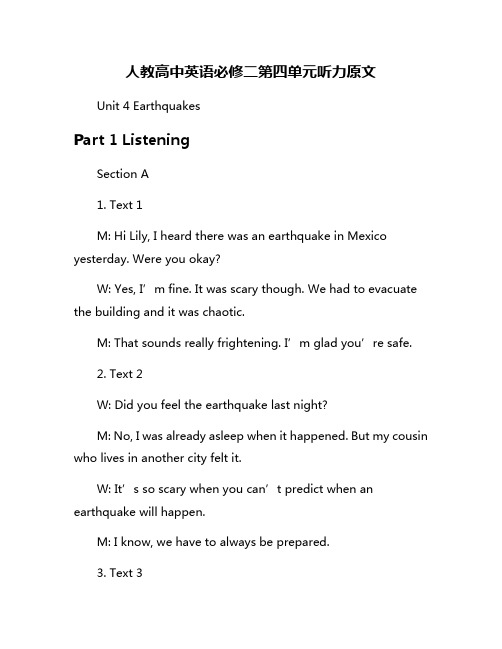
人教高中英语必修二第四单元听力原文Unit 4 EarthquakesPart 1 ListeningSection A1. Text 1M: Hi Lily, I heard there was an earthquake in Mexico yesterday. Were you okay?W: Yes, I’m fine. It was scary though. We had to evacuate the building and it was chaotic.M: That sounds really frightening. I’m glad you’re safe.2. Text 2W: Did you feel the earthquake last night?M: No, I was already asleep when it happened. But my cousin who lives in another city felt it.W: It’s so scary when you can’t predict when an earthquake will happen.M: I know, we have to always be prepared.3. Text 3M: Hey, did you see that video of the earthquake in Japan? It’s so devastating.W: I did. It’s so sad to see all the destruction that earthquakes can cause.M: Absolutely. We need to find better ways to predict and prevent them.W: Definitely.4. Text 4M: I heard that scientists are researching ways to predict earthquakes. Do you think it’s possible?W: I think so. The more we understand about the Earth’s plate movements, the better chance we have of predicting earthquakes.M: That’s true. It would save so many lives if we could predict them accurately.W: Let’s hope they make progress soon.5. Text 5W: The earthquake in Indonesia last week was terrifying. I can’t imagine going through something like that.M: It’s so heartbreaking to see the devastation. My heart goes out to all the people affected.W: Yes, let’s hope they receive the help they need to recover.Part 2 Listening ComprehensionSection B1. Text 1M: Hi, Lily. I just read about the earthquake drill at the school in Japan. It’s great that they are teaching the students how to be prepared in case of an earthquake.W: Yes, it’s so important for everyone to know what to do in case of an emergency. Being prepared can save lives.M: Absolutely. I think more schools should have earthquake drills to ensure everyone is safe.W: I agree. Safety should always come first.2. Text 2W: Did you hear about the earthquake that hit California last month?M: Yes, it was quite a big one. I hope everyone was okay.W: I heard that it caused some damage, but thankfully no one was seriously injured.M: That’s good to hear. It’s important for people to be aware of the risks of living in earthquake-prone areas.W: Definitely. Everyone should have an emergency kit prepared just in case.3. Text 3M: Hey, did you know that earthquakes are caused by the movement of the Earth’s tectonic plates?W: Yes, I learned that in my geogra phy class. It’s interesting how the plates shifting can cause such powerful earthquakes.M: It’s fascinating how the Earth works. We need to continue studying and researching to better understand earthquakes.W: Absolutely. The more we know, the better prepared we can be.4. Text 4W: I saw a documentary about the earthquake in Nepal a few years ago. It was so devastating.M: Yes, I remember hearing about that. Thousands of people lost their lives and many homes were destroyed.W: It’s heartbreaking to see the impact that natural disasters can have on people’s lives.M: We need to do more to help those affected by earthquakes and other disasters.W: Yes, it’s important to show compassion and support to those in need.5. Text 5M: I read an article about earthquake-resistant buildings being constructed in earthquake-prone areas.W: That’s great news. It’s important to design buildings that can withstand the force of an earthquake.M: Yes, it can make a huge difference in reducing the damage and saving lives during an earthquake.W: We need to invest in technology and construction methods that prioritize safety and resilience.M: Absolutely. It’s essential to be proactive in preparing for earthquakes and other natural disasters.This concludes the listening materials for Unit 4 Earthquakes. Thank you for listening.。
外研社必修二Module4听力原文
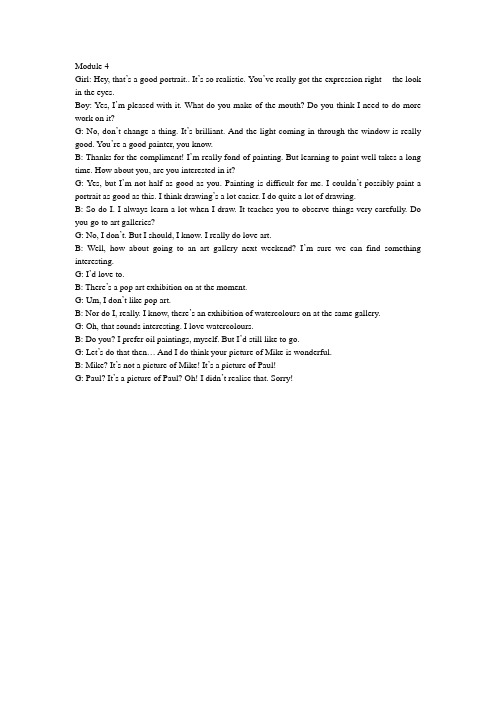
Module 4Girl: Hey, that’s a good portrait.. It’s so realistic. Y ou’ve really got the expression right--- the look in the eyes.Boy: Y es, I’m pleased with it. What do you make of the mouth? Do you think I need to do more work on it?G: No, don’t change a thing. It’s brilliant. And the light coming in through the window is really good. Y ou’re a good painter, you know.B: Thanks for the compliment! I’m really fond of painting. But learning to paint well takes a long time. How about you, are you interested in it?G: Y es, but I’m not half as good as you. Painting is difficult for me. I couldn’t possibly paint a portrait as good as this. I think drawing’s a lot easier. I do quite a lot of drawing.B: So do I. I always learn a lot when I draw. It teaches you to observe things very carefully. Do you go to art galleries?G: No, I don’t. But I should, I know. I really do love art.B: Well, how about going to an art gallery next weekend? I’m sure we can find something interesting.G: I’d love to.B: There’s a pop art exhibition on at the moment.G: Um, I don’t like pop art.B: Nor do I, really. I know, there’s an exhibition of watercolours on at the same gallery.G: Oh, that sounds interesting. I love watercolours.B: Do you? I prefer oil paintings, myself. But I’d still like to go.G: Let’s do that then… And I do think your picture of Mike is wonderful.B: Mike? It’s not a picture of Mike! It’s a picture of Paul!G: Paul? It’s a picture of Paul? Oh! I didn’t realise that. Sorry!。
(2020新教材)新人教版高中英语必修第二册unit4 Section Ⅳ Listening and Talking
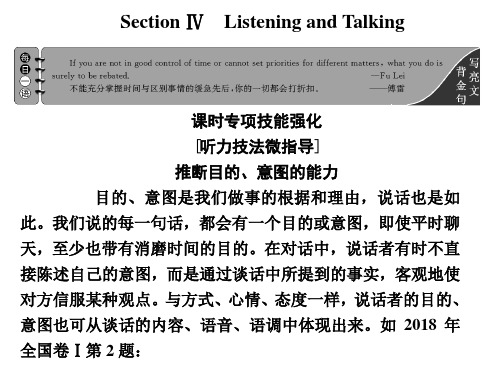
Section Ⅳ Listening and Talking
课时专项技能强化 [听力技法微指导] 推断目的、意图的能力 目的、意图是我们做事的根据和理由,说话也是如 此。我们说的每一句话,都会有一个目的或意图,即使平时聊 天,至少也带有消磨时间的目的。在对话中,说话者有时不直 接陈述自己的意图,而是通过谈话中所提到的事实,客观地使 对方信服某种观点。与方式、心情、态度一样,说话者的目的、 意图也可从谈话的内容、语音、语调中体现出来。如 2018 年 全国卷Ⅰ第 2 题:
完了,但是女售货员帮助男士订购,而且到货后还会通知男士。 由此可见,女士愿意帮忙且服务热情周到。故答案为 C 项。
[交际用语练能力] (一)根据对话内容,从对话后的选项中选出能填入空白处的最佳
选项。选项中有两项为多余选项。 W:Good morning, Mr Black. M:Good morning. __1__ W:Thank you, Mr Black. My studies about Chinese tradition
3.As we all know, China is a country _w_i_th__a_l_o_n_g__h_is_t_o_r_y_a_n_d_ _cu__lt_u_r_a_l _tr_a_d_i_t_io_n_. 众所周知,中国是一个有悠久历史和文化传统的国家。
4.Some interesting customs have _su_r_v_i_v_e_d_f_r_o_m__a_n_c_ie_n_t__ti_m_e_s_. 一些有趣的风俗已经从古代保留了下来。
Chinese history. F.You've been very helpful to me in these years. G. See you this Saturday then.
- 1、下载文档前请自行甄别文档内容的完整性,平台不提供额外的编辑、内容补充、找答案等附加服务。
- 2、"仅部分预览"的文档,不可在线预览部分如存在完整性等问题,可反馈申请退款(可完整预览的文档不适用该条件!)。
- 3、如文档侵犯您的权益,请联系客服反馈,我们会尽快为您处理(人工客服工作时间:9:00-18:30)。
1.HOW DAISY LEARNED TO HELP WLDLIFE(26页)Daisy had always longed to help endangered species of wildlife. One day she woke up and found a flying carpet by her bed. "Where do you want to go?" it asked. Daisy responded immediately. "I'd like to see some endangered wildlife," she said. "Please take me to a distant land where I can find the animal that gave fur to make this sweater." At once the carpet flew away and took her to Tibet. There Daisy saw an antelope looking sad. It said, "We're being killed for the wool beneath our stomachs. Our fur is being used to make sweaters for people like you. As a result, we are now an endangered species." At that Daisy cried, "I'm sorry I didn't know that. I wonder what is being done to help you. Flying carpet, please show me a place where there's some wildlife protection."The flying carpet travelled so fast that next minute they were in Zimbabwe. Daisy turned around and found that she was being watched by an elephant. "Have you come to take my photo?" it asked. In relief Daisy burst into laughter. "Don't laugh,”said the elephant, "We used to be an endangered species. Farmers hunted us without mercy. They said we destroyed their farms, and money from tourists only went to the large tour companies. So the government decided to help. They allowed tourists to hunt only a certain number of animals if they paid the farmers. Now the farmers are happy and our numbers are increasing. So good things are being done here to save local wildlife."Daisy smiled. "That's good news. It shows the importance of wildlife protection, but I'd like to help as the WWF suggests." The carpet rose again and almost at once they were in a thick rainforest. A monkey watched them as it rubbed itself. "What are you doing?" asked Daisy. ”I’m protecting myself from mosquitoes," it replied. "When I find a millipede insect, I rub it over my body. It contains a powerful drug which affects mosquitoes. You should pay more attention to the rainforest where I live and appreciate how the animals live together. No rainforest, no animals, no drugs."Daisy was amazed. "Flying carpet, please take me home so I can tell WWF and we can begin producing this new drug. Monkey, please come and help." The monkey agreed. The carpet flew home. As they landed, things began to disappear. Two minutes later everything had gone - the monkey, too. So Daisy was not able to make her new drug. But what an experience! She had learned so much! And there was always WWF…第四单元阅读一Daisy如何学习去帮助野生动物Daisy常常渴望去帮助濒临灭绝的种类的野生动物。
一天她醒来发现一个正在飞行的飞毯在她包里。
“你想去哪里?”它问。
Daisy立刻回答它。
“我想去看那些濒临灭绝的动物,”她说。
“请带我去那个我可以找到供给皮毛去制造这件毛衣的动物的一个遥远的地方。
”飞毯立刻带她飞去了。
在那里Daisy看到了一支看起来很伤心的羚羊。
它说,“我们被杀是为了我们肚子下的毛。
我们的皮毛被人类用来制造像你这样的毛衣。
因此,现在我们是一种濒临灭绝的种类。
”然后Daisy哭喊着,“我很抱歉我不知道那些。
我想知道神马可以被做来帮助你们。
飞毯,请带我去一个有一些野生动物保护区的地方。
”飞毯飞得如此的快以至于他们下一分钟就在Zimbabwe。
Daisy转来转去然后发现她被一头大象盯着。
“你过来跟我照相了么?”它问。
Daisy松了口气突然笑起来。
“不要笑,”大象说,“我们曾经是濒临灭绝的品种。
农民好不仁慈地猎杀我们。
他们说我们破坏了他们的天地,和来自那些只游览大工厂的游客的钱。
所以政府决定去帮助。
他们允许游客给钱农民然后可以去猎杀确定数量的动物。
现在农民很高兴而且我们的数量在增加。
所以好事情正被做于营救当地的野生动物。
”Daisy微笑了。
“那是个好消息。
它展示了野生动物保护的重要性,不过我喜欢去帮助像WWF这样的建议。
”飞毯再次升起然后几乎同一时间他们在一个阴霾的热带雨林。
一支猴子看着他们就像它摩擦它自己。
“你在干神马?”Daisy问。
“我在保护自己不受蚊子的伤害,”它回答。
“当我找到一只千足虫昆虫,我会在我身上摩擦它。
它包涵了一种强大的可以影响蚊子的药物。
你应该更加注意那些我居住的热带雨林并好好鉴赏动物们如何居住在一齐。
没有雨林,没有动物,没有药物。
”Daisy很惊讶。
“飞毯,请带我回家这样我可以联系WWF并开始保护这种新的药物。
猴子,请过来帮忙。
”那猴子同意了。
飞毯飞回家了。
当他们降落时,事物开始消失了。
两分钟后所有东西都消失了-那只猴子也是。
所以Daisy不能去制造她的新药物。
不过如此的一段经历!她已经学习了那么多!还有那里的WWF......ANIMAL EXTINCTION(30页)Many animals have disappeared during the long history of the earth. The most famous of these animals are dinosaurs. They lived on the earth tens of millions of years ago, long before humans came into being and their future seemed secure at that time.There were many different kinds of dinosaur and a number of them used to live inChina. The eggs of twenty-five species have been found in Xixia, County, Nanyang, Henan Province. Not long ago a rare new species of bird-like dinosaur was discovered in Chaoyang County, Liaoning Province. When scientists inspected the bones, they were surprised to find that these dinosaurs could not only run like the others but also climb trees. They learned this from the way the bones were joined together. Dinosaurs died out suddenly about 65 million years ago. Some scientists think it came after an unexpected incident when a huge rock from space hit the earth and put too much dust into the air. Others think the earth got too hot for the dinosaurs to live on any more. Nobody knows for sure why and how dinosaurs disappeared from the earth in such a short time.We know many other wild plants, animals, insects and birds have died out more recently. According to a UN report, some 844 animals and plants have disappeared in the last 500 years. The dodo is one of them. It lived on the Island of Mauritius and was a very friendly animal. Please listen to a story of the dodo and how it disappeared from the earth.从地球有史以来的这段漫长时期,许多动物都消失了。
